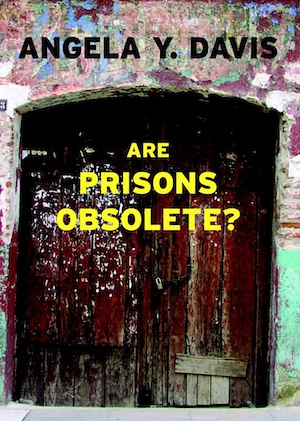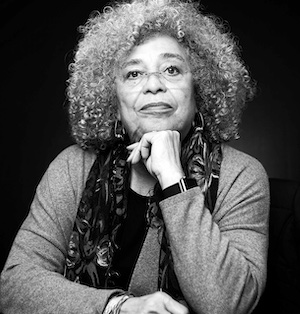By Nathan Kouri
At this point in American history, it’s rare for a book to have widespread cultural impact. You wouldn’t expect an exception to this rule to come in the form of an academic book published nearly two decades ago, but in the past year Are Prisons Obsolete? by Angela Davis (ΦBK, Brandeis University) has made that kind of nationwide splash, sparking discussions, cropping up on book club lists, and inspiring countless newspaper columns. The book’s renewed popularity came in the wake of mass protests against racism and police brutality in response to the murder of George Floyd. Looking for solutions, some turned to Davis’ book, which proposes that “the most difficult and urgent challenge today is that of creatively exploring new terrains of justice, where the prison no longer serves as our major anchor.” By the end of the year, Time magazine named Davis among the 100 most influential people of 2020.

A distinguished author, activist, and professor emerita at the University of California, Santa Cruz, Davis had her own infamous experience with incarceration in the early 1970s. After a courtroom takeover by a student using firearms registered to Davis, the FBI listed her among the Ten Most Wanted, Nixon called her a “dangerous terrorist,” and she spent 18 months in jail before she was found not guilty on all charges. The charges were murder, kidnapping, and conspiracy, but many viewed her—a member of the Communist Party, supporter of the Black Panthers, opponent of the Vietnam War—as a political prisoner. A few years earlier the University of California Board of Regents, at the insistence of Governor Reagan, fired Davis from her UCLA professorship for her involvement in the Communist Party.
The challenging ideas in Davis’ work have always made people uncomfortable, and prison abolition is one of the most contentious. The difficulty of envisioning a society without prisons tends to make some people shut down the conversation altogether. The sight of me reading Are Prisons Obsolete? in public spurred one stranger to say, unprompted, that the best alternative to prisons is the death penalty across the board. In an interview with the New York Times, Davis explained the importance of imagination to her politics: “The abolitionist imagination delinks us from that which is. It allows us to imagine other ways of addressing issues of safety and security.” As she writes in Are Prisons Obsolete?: “It should be remembered that the ancestors of many of today’s most ardent liberals could not have imagined life without slavery, life without lynching, or life without segregation.”
Though Davis has been doing decarceration work for decades, the question in her title is not rhetorical. She doesn’t assume the reader agrees with her from the outset or that they’re already familiar with research on the subject. She makes her case from the ground up, condensing key arguments that cover the history of prisons from different angles—as a progressive alternative to the death penalty; as a continuation of slavery, lynching, and segregation; as an institution that reforms for the worse; as an enforcer of gender roles and sexual violence; as a corporate profit machine expanding exponentially. This broad approach makes Are Prisons Obsolete? a useful introduction, a combination of scholarship and activism that’s accessible, erudite, and more inspiring than dispiriting. The Noname Book Club is one group that uses Are Prisons Obsolete? for that purpose, sending it to prisoners across the country along with other selections like Assata Shakur’s autobiography, Whereas by Layli Long Soldier, and Tar Baby by Toni Morrison.
Like the Noname Book Club, Davis sees a connection between literature and revolutionary politics, and how they affect everyday life. “The canon of American letters has been contested previously, and if one considers the autobiography of Malcolm X as an example, which, along with literature by such writers as Zora Neale Hurston, Alice Walker, and Toni Morrison, that has clearly made its way into the canon, one can ask whether the inclusion of oppositional writing has really made a difference. Has the canon itself has been substantively transformed? It seems to me that struggles to contest bodies of literature are similar to the struggles for social change and social transformation. What we manage to do each time we win a victory is not so much to secure change once and for all, but rather to create new terrains for struggle.”
Davis’ enduring hope for a better world is energized by these new terrains, she told the Times: “We didn’t include gender issues in [earlier] struggles,” she said. “There would have been no way to imagine that trans movements would effectively demonstrate to people that it is possible to effectively challenge what counts as normal in so many different areas of our lives . . . . A part of me is glad that we didn’t win the revolution we were fighting for back then, because there would still be male supremacy. There would still be hetero-patriarchy. There would be all of these things that we had not yet come to consciousness about.”
The most recent book by Angela Davis is Freedom Is a Constant Struggle: Ferguson, Palestine, and the Foundations of a Movement. This fall, Haymarket Books will publish a collection she co-authored titled Abolition. Feminism. Now. along with a reprinting of Davis’ 1974 autobiography with a new introduction by the author.
Nathan Kouri earned his bachelor’s degree in English and cinema from the University of Iowa, where he was inducted into Phi Beta Kappa in 2019. The University of Iowa is home to the Alpha of Iowa chapter of Phi Beta Kappa.




